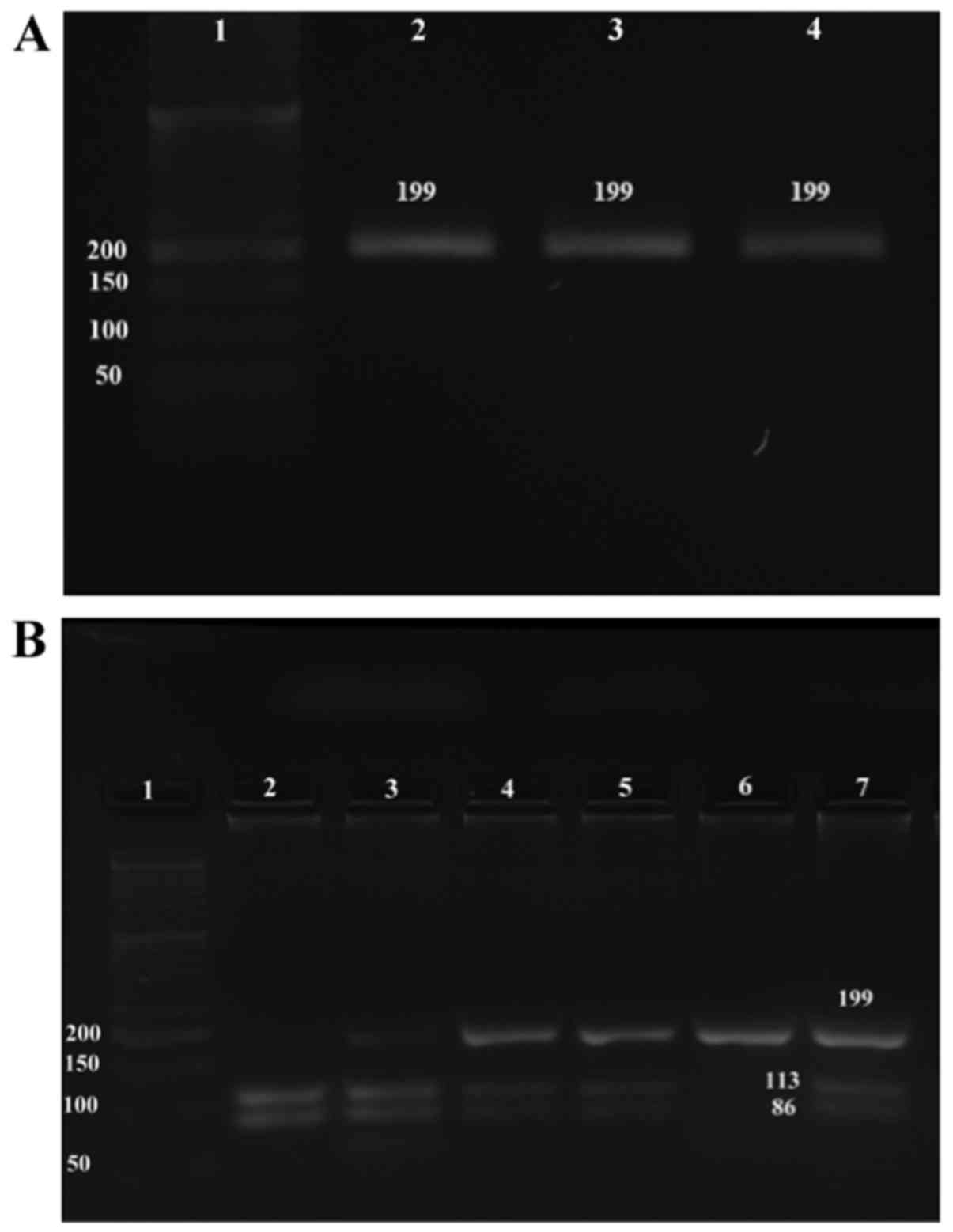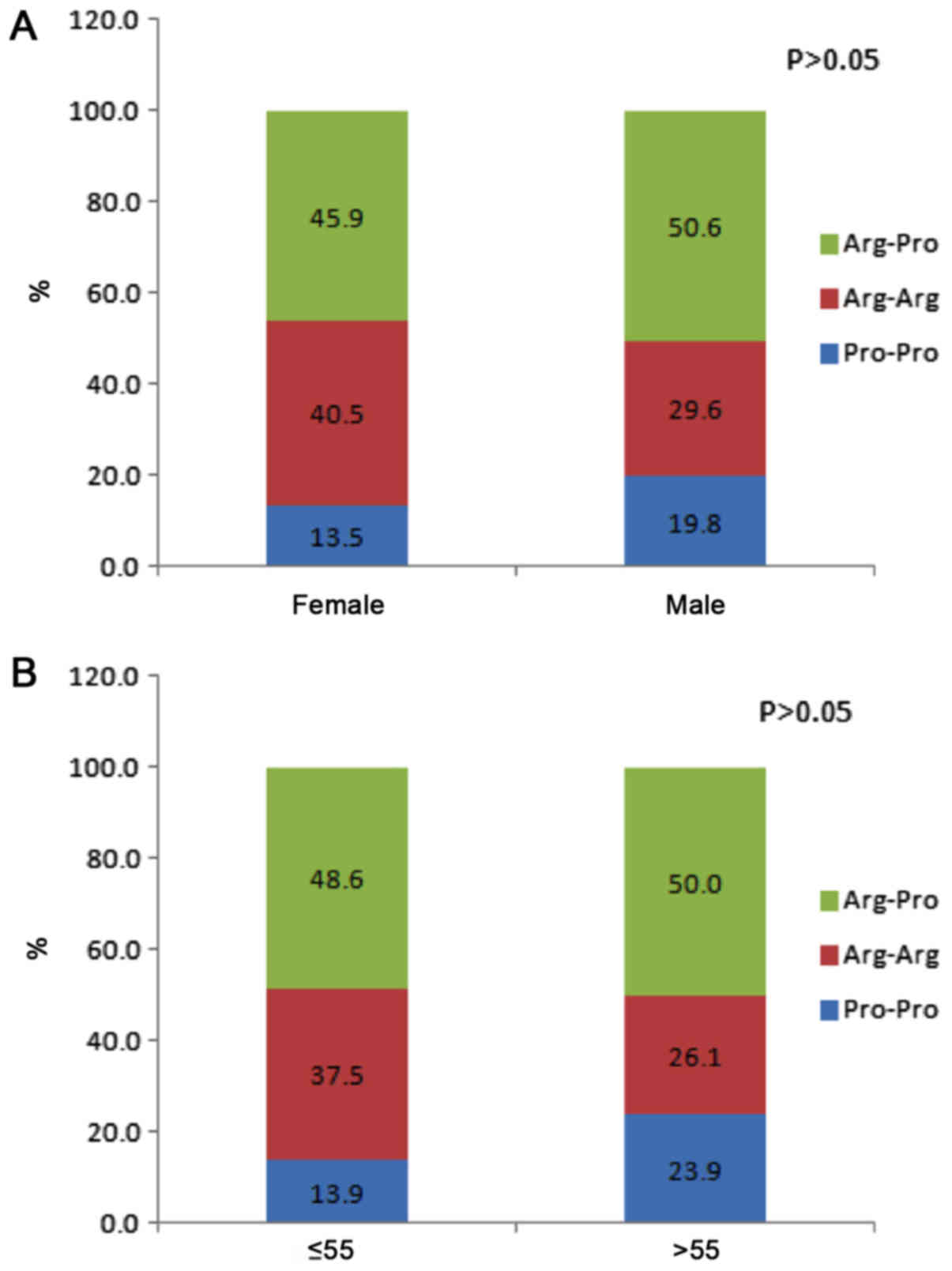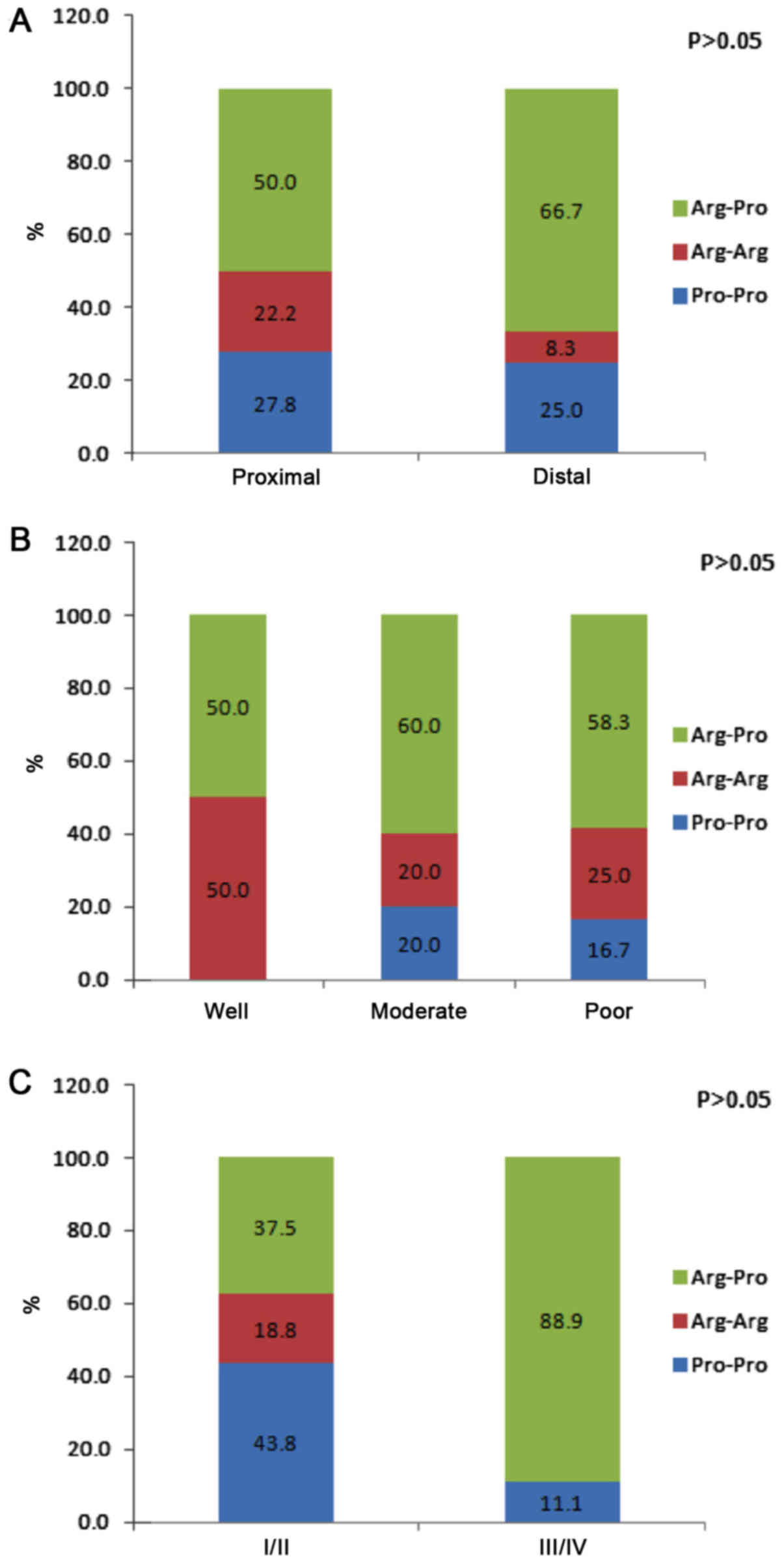|
1
|
Wang C, Zhang J, Cai M, Zhu Z, Gu W, Yu Y
and Zhang X: DBGC: A Database of Human Gastric Cancer. PLoS One.
10:e01425912015. View Article : Google Scholar : PubMed/NCBI
|
|
2
|
El-Omar EM, Carrington M, Chow WH, McColl
KE, Bream JH, Young HA, Herrera J, Lissowska J, Yuan CC, Rothman N,
et al: Interleukin-1 polymorphisms associated with increased risk
of gastric cancer. Nature. 404:398–402. 2000. View Article : Google Scholar : PubMed/NCBI
|
|
3
|
Ang TL and Fock KM: Clinical epidemiology
of gastric cancer. Singapore Med J. 55:621–628. 2014. View Article : Google Scholar : PubMed/NCBI
|
|
4
|
Eybpoosh S, Talebkhan Y, Saberi S,
Esmaeili M, Oghalaie A, Ebrahimzadeh F, Karimi T, Abdirad A,
Nahvijou A, Mohagheghi MA, et al: Mohammadi M. Age-specific gastric
cancer risk indicated by the combination of Helicobacter pylori
sero-status and serum pepsinogen levels. Iran Biomed J. 19:133–142.
2015.PubMed/NCBI
|
|
5
|
Zali H, Rezaei-Tavirani M and Azodi M:
Gastric cancer: Prevention, risk factors and treatment.
Gastroenterol Hepatol Bed Bench. 4:175–185. 2011.PubMed/NCBI
|
|
6
|
Yasui W, Sentani K, Sakamoto N, Anami K,
Naito Y and Oue N: Molecular pathology of gastric cancer: Research
and practice. Pathol Res Pract. 207:608–612. 2011. View Article : Google Scholar : PubMed/NCBI
|
|
7
|
Arjmand Kolukhi Z, Salehi Z, Mashayekhi F,
Najafi B and Mirpoor S: Analysis of Glu298Asp eNOS Gene
polymorphism in patients with Gastric Cancer in the Guilan
population. Analysis. 17:53–62. 2014.
|
|
8
|
Hossein Pour Feizi MA, Ravanbakhsh Gavgani
R, Pourahmad R, Pouladi N, Azarfam P and Montazeri V: Association
of p53 Arg/Pro polymorphism at codon 72 with risk of breast cancer
in east azerbaijani women. J Babol Univ Med Sci. 14:31–38.
2012.
|
|
9
|
Buyru N, Tigli H and Dalay N: P53 codon 72
polymorphism in breast cancer. Oncol Rep. 10:711–714.
2003.PubMed/NCBI
|
|
10
|
Gloria-Bottini F, Banci M, Saccucci P,
Neri A, Bottini E and Magrini A: p53 codon 72 polymorphism and
coronary artery disease: Evidence of interaction with ACP1. Med Sci
Monit. 18:CR712–CR715. 2012. View Article : Google Scholar : PubMed/NCBI
|
|
11
|
Lin HY, Huang CH, Wu WJ, Chang LC and Lung
FW: TP53 codon 72 gene polymorphism paradox in associated with
various carcinoma incidences, invasiveness and chemotherapy
responses. Int J Biomed Sci. 4:248–254. 2008.PubMed/NCBI
|
|
12
|
Kalemi TG, Lambropoulos AF, Gueorguiev M,
Chrisafi S, Papazisis KT and Kotsis A: The association of p53
mutations and p53 codon 72, Her 2 codon 655 and MTHFR C677T
polymorphisms with breast cancer in Northern Greece. Cancer Lett.
222:57–65. 2005. View Article : Google Scholar : PubMed/NCBI
|
|
13
|
Weng Y, Lu L, Yuan G, Guo J, Zhang Z, Xie
X, Chen G and Zhang J: p53 codon 72 polymorphism and hematological
cancer risk: An update meta-analysis. PLoS One. 7:e458202012.
View Article : Google Scholar : PubMed/NCBI
|
|
14
|
Yu KD, Di GH, Yuan WT, Fan L, Wu J, Hu Z,
Shen ZZ, Zheng Y, Huang W and Shao ZM: Functional polymorphisms,
altered gene expression and genetic association link NRH:quinone
oxidoreductase 2 to breast cancer with wild-type p53. Hum Mol
Genet. 18:2502–2517. 2009. View Article : Google Scholar : PubMed/NCBI
|
|
15
|
Liu Y, Zhang X, Han C, Wan G, Huang X,
Ivan C, Jiang D, Rodriguez-Aguayo C, Lopez-Berestein G, Rao PH, et
al: TP53 loss creates therapeutic vulnerability in colorectal
cancer. Nature. 520:697–701. 2015. View Article : Google Scholar : PubMed/NCBI
|
|
16
|
Stacey SN, Sulem P, Jonasdottir A, Masson
G, Gudmundsson J, Gudbjartsson DF, Magnusson OT, Gudjonsson SA,
Sigurgeirsson B, Thorisdottir K, et al Swedish Low-risk Colorectal
Cancer Study Group, : A germline variant in the TP53
polyadenylation signal confers cancer susceptibility. Nat Genet.
43:1098–1103. 2011. View
Article : Google Scholar : PubMed/NCBI
|
|
17
|
Khatami F, Noorinayer B, Ghiasi S, Mohebi
R, Hashemi M and Zali MR: Single nucleotide polymorphisms of DNA
methyltransferase 1 gene and gastric cancer in iranian patients: a
case control study. Asian Pac J Cancer Prev. 10:1177–1182.
2009.PubMed/NCBI
|
|
18
|
Amoori N, Mahdavi S and Enayatrad M:
Epidemiology and trend of stomach cancer mortality in Iran. Int J
Epidemiol Res. 3:268–275. 2016.
|
|
19
|
Hedayatizadeh-Omran A, Rafiei A,
Alizadeh-Navaei R, Tehrani M, Valadan R, Moradzadeh K, Panbechi M
and Taghavi SM: Role of HER2 in brain metastasis of breast cancer:
A systematic review and meta-analysis. Asian Pac J Cancer Prev.
16:1431–1434. 2015. View Article : Google Scholar : PubMed/NCBI
|
|
20
|
Hedayatizadeh-Omran A, Rafiei A, Khajavi
R, Alizadeh-Navaei R, Mokhberi V and Moradzadeh K: Association
between ghrelin gene (Leu72Met) polymorphism and ghrelin serum
level with coronary artery diseases. DNA Cell Biol. 33:95–101.
2014. View Article : Google Scholar : PubMed/NCBI
|
|
21
|
Uchino S, Noguchi M, Ochiai A, Saito T,
Kobayashi M and Hirohashi S: p53 mutation in gastric cancer: A
genetic model for carcinogenesis is common to gastric and
colorectal cancer. Int J Cancer. 54:759–764. 1993. View Article : Google Scholar : PubMed/NCBI
|
|
22
|
Matei MC, Negură L, Liliac L, Negură A and
Azoicăi D: Validation of PCR-RFLP techniques for the evaluation of
codon 72 of p53 and CYP1A1 gene's polymorphisms in relation with
ovarian cancer in a Romanian population. Rom J Morphol Embryol.
53:47–54. 2012.PubMed/NCBI
|
|
23
|
Pandey R, Misra V, Misra SP, Dwivedi M and
Misra A: Helicobacter pylori infection and a P53 codon 72 single
nucleotide polymorphism: A reason for an unexplained Asian enigma.
Asian Pac J Cancer Prev. 15:9171–9176. 2014. View Article : Google Scholar : PubMed/NCBI
|
|
24
|
Chung WC, Lee KM, Lee BI, Chun JS, Lee SY,
Chang UI, Park SH, Yang JM, Choi KY and Chung IS: P53 genetic
polymorphism of gastric cancer in Korea. Korean J Intern Med.
21:28–32. 2006. View Article : Google Scholar : PubMed/NCBI
|
|
25
|
Liu X, Wang S, Xia X, Chen Y, Zhou Y, Wu
X, Zhang J, He S, Tan Y, Qiang F, et al: Synergistic role between
p53 and JWA: Prognostic and predictive biomarkers in gastric
cancer. PLoS One. 7:e523482012. View Article : Google Scholar : PubMed/NCBI
|
|
26
|
Zhou Y, Li N, Zhuang W and Wu X: p53 Codon
72 polymorphism and gastric cancer risk in a Chinese Han
population. Genet Test Mol Biomarkers. 14:829–833. 2010. View Article : Google Scholar : PubMed/NCBI
|
|
27
|
Shen H, Solari A, Wang X, Zhang Z, Xu Y,
Wang L, Hu X, Guo J and Wei Q: P53 codon 72 polymorphism and risk
of gastric cancer in a Chinese population. Oncol Rep. 11:1115–1120.
2004.PubMed/NCBI
|
|
28
|
Zhou Y, Li N, Zhuang W, Liu GJ, Wu TX, Yao
X, Du L, Wei ML and Wu XT: P53 codon 72 polymorphism and gastric
cancer: A meta-analysis of the literature. Int J Cancer.
121:1481–1486. 2007. View Article : Google Scholar : PubMed/NCBI
|
|
29
|
Liu KJ, Qi HZ, Yao HL, Lei SL, Lei ZD, Li
TG and Zhao H: An updated meta-analysis of the p53 codon 72
polymorphism and gastric cancer risk. Mol Biol Rep. 39:8265–8275.
2012. View Article : Google Scholar : PubMed/NCBI
|
|
30
|
Kang S, Duan LH, Zhang JH, Guo W, Wang N
and Li Y: Association of p53 gene polymorphism with susceptibility
to ovarian cancer. Zhonghua Fu Chan Ke Za Zhi. 39:754–758. 2004.(In
Chinese). PubMed/NCBI
|
|
31
|
Tang NP, Wu YM, Wang B and Ma J:
Systematic review and meta-analysis of the association between P53
codon 72 polymorphism and colorectal cancer. Eur J Surg Oncol.
36:431–438. 2010. View Article : Google Scholar : PubMed/NCBI
|
|
32
|
Liu Y, Qin H, Zhang Y, Shi T, Liu B, Sun Y
and Ma Y: P53 codon 72 polymorphism and colorectal cancer: A
meta-analysis of epidemiological studies. Hepatogastroenterology.
58:1926–1929. 2011.PubMed/NCBI
|
|
33
|
Jing G, Lv K and Jiao X: The p53 codon 72
polymorphism and the risk of oral cancer in a Chinese Han
population. Genet Test Mol Biomarkers. 16:1149–1152. 2012.
View Article : Google Scholar : PubMed/NCBI
|
|
34
|
Zhang R, Chen W, Zhang W, Jiang Q, Liu C,
Lin Y, Hu Z, Yu S and Xu G: Genetic polymorphisms of p53 codon 72
and bladder cancer susceptibility: A hospital-based case-control
study. Genet Test Mol Biomarkers. 15:337–341. 2011. View Article : Google Scholar : PubMed/NCBI
|
|
35
|
Suzuki K, Matsui H, Ohtake N, Nakata S,
Takei T, Nakazato H, Okugi H, Koike H, Ono Y, Ito K, et al: A p53
codon 72 polymorphism associated with prostate cancer development
and progression in Japanese. J Biomed Sci. 10:430–435. 2003.
View Article : Google Scholar : PubMed/NCBI
|
|
36
|
Jia S, Xu L, Chan Y, Wu X, Yang S, Yu H,
Yang H, Luo Y and Tang W: p53 codon 72 polymorphism and
endometriosis: A meta-analysis. Arch Gynecol Obstet. 285:1657–1661.
2012. View Article : Google Scholar : PubMed/NCBI
|
|
37
|
Lao X, Chen Z and Qin A: p53 Arg72Pro
polymorphism confers the susceptibility to endometriosis among
Asian and Caucasian populations. Arch Gynecol Obstet.
293:1023–1031. 2016. View Article : Google Scholar : PubMed/NCBI
|
|
38
|
Soleimani A, Rahmani Y, Farshchian N,
Delpisheh A, Khassi K, Shahmohammadi A and Amirifard N: The
evaluation of p53 polymorphism at codon 72 and association with
breast cancer in Iran: A systematic review and meta-analysis. J
Cancer Prev. 21:1–293. 2016. View Article : Google Scholar : PubMed/NCBI
|

















